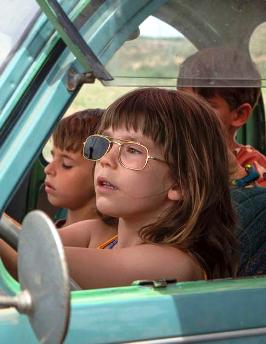 A family peach farm in Catalonia must face its end, in this gorgeous evocation of people’s bond with the land.
A family peach farm in Catalonia must face its end, in this gorgeous evocation of people’s bond with the land.
Our connection to the land is one of the central facts of human existence. It’s also true that this connection is not felt so widely or strongly as it used to be, with urban environments growing ever more dominate. Now Spanish director Carla Simón presents a film exploring a family’s deep bond to the farm they live on, and the tragedy of gradual separation from the land. It’s called Alcarràs, and it takes place in a region of that name in Catalonia, the northeast part of Spain that has its own distinctive character and language. And all the characters in the film speak Catalan.
We open with three little kids playing in an abandoned car in a field: Iris and her twin boy cousins, pretending to be in a rocket ship, with the full conviction only kids can summon, while, ominously, an excavator works nearby digging up the field in which they’re playing. The children are part of a large extended family of peach farmers.
We see next a family meeting where bad news is breaking. The grandfather had made a handshake deal with the landowner after the Civil War. The landowner has died, and his son now plans to convert everything to a solar power plant. The older son, Quimet, rages against his father’s foolishness in trusting to a handshake and not getting their rights to the land on a piece of paper, meaning they are now facing the eventual end of their farm.
The rest of the film will let us experience things from the point of view of each member of this family: Quimet’s wife Dolors, fiercely loving and protective; his sisters and brother-in-law, who want to accept working for the solar panel company; his teenage son who tries to be of help but gets the brunt of his father’s anger; and his lonely, sensitive, teenage daughter Mariona, who sees with anxiety the conflict around her, and has trouble understanding. Simón has the remarkable ability to bring us inside the subjective point of view of each character so that our experience is multifaceted. And all the while the film pays close attention to the daily manual labor of tending and harvesting the peach trees; we feel what it’s like to have this close, concentrated relationship to the orchard and the fruit, and to live in this cycle of hands-on work, and we realize that getting rid of this kind of farming by a small landholding class ends up getting rid of the kind of human beings that will grow up within that environment.
Even as Simón draws our attention to the numerous dramas between the adults, and the feelings of the teenagers, she returns again to the play of the children, who enact in a way the family’s desire for stability. She also brings a feminist perspective to the story by giving full weight to the points of view of the women and girls, along with some critical attitudes towards the stubbornness and conflicts of the men.
With such a supple and versatile narrative approach, one can only allow the beauty and fatefulness of this movie to sink into the heart and permeate the senses. Alcarràs is a work of profound feeling and insight, and despite everything, a prayer of hope in the future.

Bong Joon Ho’s fiendishly clever new film takes aim at the issue of class, reflected in a tale of a family of criminals invading...

Fritz Lang’s 1931 crime picture remains one of the greatest depictions of social rot ever put on film. Once in awhile I get asked...

A junior high school in Germany is a microcosm of society in The Teachers’ Lounge, a film directed by İlker Çatak, and written by...